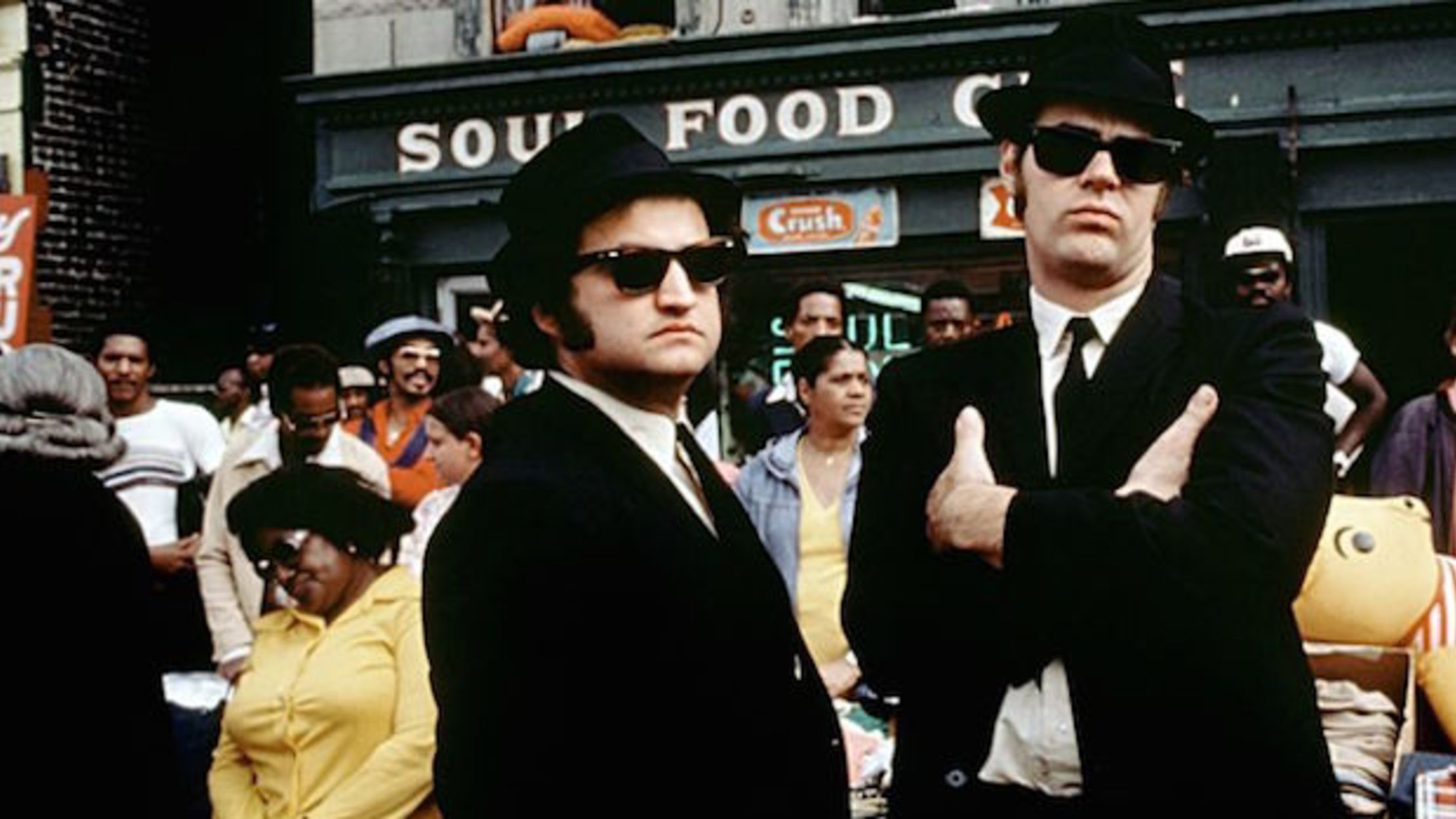40 years ago, Jake Blues (John Belushi) was released from Joliet Correctional Centre. Despite being a zany musical-comedy, The Blues Brothers opens with landscapes of smoke-filled industrial skies, and long silent scenes as Jake is being escorted out of prison. But once the gates open, the bassline of “She Caught the Katy” begins the play, and a magnificent sunrise bursts through onto Jake’s waiting blood-brother Elwood (Dan Aykroyd); the Blues Brother have been reunited.

Escapism is often a subtext of the musical genre; envisioning a world brighter and more magical than ordinary life. It’s why, alongside developing sound-technology, there was a boom in movie-musicals during the Great Depression, why Disney characters sing about their frustrated desires, and why it forms the thesis for Lars Von Trier’s gruelling Dancer in the Dark. But Blues music itself was born from troubles and hardship, having roots in slavery and work-songs. The Blues Brothers layers the gritty streets of Chicago as places of need and of creativity. When their childhood orphanage requires $5,000 in back-taxes, Jake becomes struck with a literal divine revelation when listening to the Black gospel choir of Reverend Cleophus James (James Brown); music will be their saviour. They’ll get the band back together.
The Blues Brothers is mostly an irreverent farce, lacking the political agenda of musicals like Hair, or even Hairspray. But there is a of scrappy underdogs raised on the musical culture of African-Americans, being hounded by Country musicians, the Illinois Police Department, and literal Nazis. White authorities become determined to silence the Rhythm & Blues band on their “mission from God”, excessively escalating the seemingly infinite car-chase (in which a record-breaking 103 cars were destroyed). A sly joke is when a policeman announces “use of unnecessary violence in the apprehension of the Blues Brothers has been approved”. The car-chase does not rely upon realistic tension like Bullitt or The French Connection, but rather on cartoonish absurdity – like Blazing Saddles – to mock the needless oppression of outspoken voices.

Of course, nowadays the issue of two white men headlining this African-American music is rightfully recognised. But back in 1980, certain theatre-chains booked fewer screenings of The Blues Brothers as they determined white audiences would not watch a ‘black movie’, regardless of the leads’ race. It was one of several backstage problems The Blues Brothers faced, including Belushi’s rampant cocaine abuse and it exceeding the initial budget by $10 million, which at $27.5 million (or $81.3 million today) made it one of the most expensive comedies ever made.
Universal Pictures wrestled with Belushi and Aykroyd, who had formed “The Blues Brothers” band together on Saturday Night Live and pitched the movie adaptation. Yet unlike other SNL-films like Wayne’s World or MacGruber, The Blues Brothers was not really a joke. Instead it was a sincere cover-band birthed from the pair’s genuine love of Blues music, which made a double-platinum album Briefcase Full of Blues in 1978. Therefore, the film’s music is not comedic, but tributes that exhibit retro-stars like Cab Calloway, Aretha Franklin, James Brown and Ray Charles. Universal had wanted to include contemporary hits like Rose Royce of “Car Wash” fame, instead of these old-fashioned songs, but The Blues Brothers proved the tunes timeless and actually led to a revival of Blues music in America. Belushi and Aykroyd managed to maintain creative control, alongside John Landis who had directed Belushi in 1978’s extremely successful hit Animal House, leaving The Blues Brothers with its strange mixture of idiosyncratic sketch-show humour and soundtrack of sincere performances.

As the Brothers, the two co-stars are wonderfully deadpan, their straight-faced demeanour barely flinching when jiving or cartwheeling onstage, not removing their sunglasses even in the dark night. When Jake’s maniacal ex-fiancée (Carrie Fisher, who actually got engaged to Aykroyd on-set) blows up their phonebooth with a flamethrower, their immediate reaction is remarking how “there’s gotta be at least $7 worth of change here”. Plus there’s something laudable about their single-minded determination, evading the police not for themselves but for the orphanage, handing over the cheque to the Cook County Assessor (Steven Spielberg) just before they are handcuffed. Indeed their devotion to their Catholic orphanage meant the Vatican anointed The Blues Brothers a “Catholic Classic” in 2010.
The timeless music has aged better than the humour, which upon re-watch feels slightly clunky. Comedy is the quickest to age, and The Blues Brothers features some mis-deliveries that lead to some dusty silences. Yet much of the film barely feels like a straightforward comedy, but rather a film following its own bizarre rhythms, like the Brothers announcing their upcoming show when riding their “Bluesmobile” through an empty field. Many of its quotable moments (such as “No ma’am, we’re musicians”) are less obvious jokes, but memorable for themselves. Although different in many ways, it is reminiscent of The Rocky Horror Picture Show, another musical which achieved cult-status for its uniqueness. Regardless of the slower moments, The Blues Brothers still works for its pockets of howling songs and gleeful destruction.
The film was not hugely successful when first released, but since has grown into an 80s classic that has enjoyed international renown. Jake and the band might end the film back in prison, but as they joyously play “Jailhouse Rock”, they prove that the music cannot be contained.
